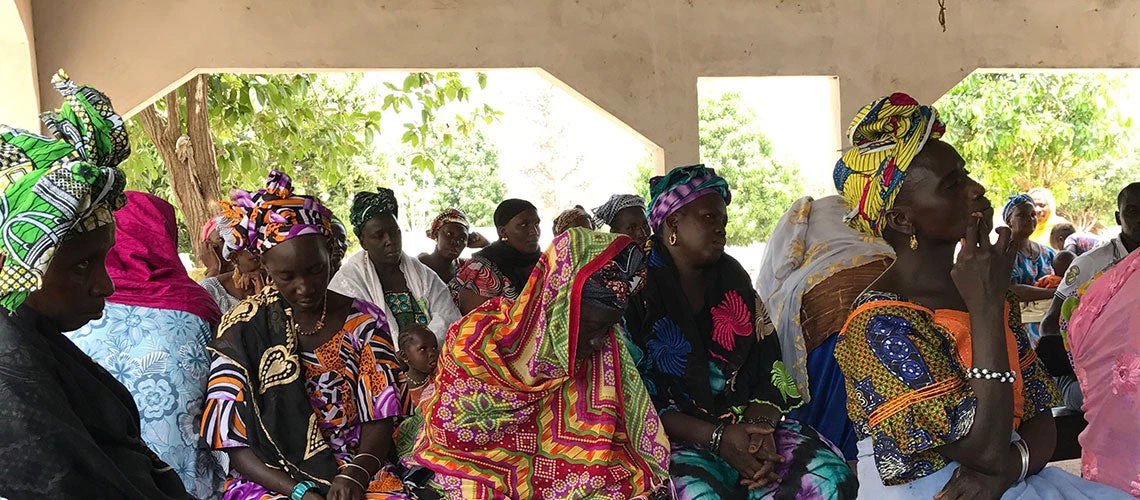 A new cash transfer program aims to empower women and girls by encouraging households will be encouraged to name a woman as the main recipient.
A new cash transfer program aims to empower women and girls by encouraging households will be encouraged to name a woman as the main recipient.
“Did you ask mom first? Did you ask dad at all?” As an American with Gambian parents, I heard these two statements every time I wanted to do anything when I was a child. It was standard. Now that I am older, I realize just how uncommon these questions actually were in the communities my parents are from.
In The Gambia, men, as household heads, are expected to make decisions regarding family income and use assets for the benefit of the family, without any form of consultation with family members, even when those decisions affect women’s lives. Whereas, women may have their own assets but must consult with their husbands first; not doing so may include physical violence or divorce. Department of Household Survey data from 2013 shows that a higher percentage of women than men (58% versus 33%) agree that wife beating is justified. The fact that women seemingly accept physical violence indicates the need for more positive change. It is this acceptance that condones negative perceptions of women by both men and women.
Male governance is engrained in all forms of decision-making. A 2019 qualitative study on gender and intrahousehold allocation in The Gambia showed that 58% of respondents—men and women—prefer husbands to receive cash transfers. But this rather startling fact does not reflect a lack of desire for change; research has shown that Gambian women living below the poverty line have great aspirations to break intergenerational poverty cycles by investing in the productive human capital of their children. There also is a cry for support for education, where children will be educated for a better future, women will be supported with farming inputs and help to set up business enterprises like poultry, petty trading, with the backing from government interventions.
To support women’s goals, the Government of Gambia, in partnership with the World Bank, launched the Nafa (translation; ‘something that benefits you’) Cash Transfer Program. Fifteen thousand extremely poor households—40% of the country’s extreme poor—will receive bi-monthly cash payments for food security, health, education and schooling costs. And, if possible, for savings or investments in micro-enterprises.
The project will support and empower women and young girls by encouraging households to name a woman as the main unconditional cash transfer recipient and giving families an option to opt out if they fear this will lead to violence. The program also provides specific messaging to children and their families about nutrition, health, and schooling.
Widespread evidence shows that cash transfers have large positive effects on education and health services, as well as nutrition as well. In particular, in their study, Realizing the Full Potential of Social Safety Nets in Africa, Beegle et al. find that cash transfers can generate a 6% rise in school attendance and a 7% rise in enrollment relative to baseline rates. Health expenditures increase, within the range of 0–63%, with a mean impact of 24%. The study also notes that these advances are consistent with reduced child labor and increased purchases of school uniforms and/or fees.
As Penny Williams, World Bank task team leader of the project noted, “Frankly, early childhood is most critical in human development, and early interventions have the potential to mitigate negative effects of poverty, promote equitable opportunities, and generate high rates of return. Women have a critical role to play and ensuring that some household resources are under their control can promote better outcomes for the family’s children.” The program is designed to take into account the high rates of illiteracy among these communities. Thus, there is an opportunity in the program to impact girls’ empowerment in schools through modules that speak on maternal health and family planning, to nutrition, and overcoming barriers to schooling.
To avoid further intra-household tensions or potential violence, the cash transfer is accompanied by social and behavioral change communications (SBCC) that challenge social norms and harmful practices by explaining the importance of women’s decision-making. The modules target different segments of the community including mothers, fathers, and others in the community (such as the elderly) by engaging community-level trainers like the Village Development Committees formed by the 2002 Local Government Act—topics include interpersonal violence, financial literacy, and entrepreneurship.
The program goes beyond the cash transfer and SBCC to bring greater visibility to intrahousehold well-being and empowerment. It emphasizes integration with other development efforts to further empower women. Williams added: “Through the program, strong efforts are being made to link women with opportunities for skills training opportunities and employment nearby. The idea is to empower women to make investments that will support their family’s chances of escaping poverty in the medium term, for example, by saving more or engaging in small-scale enterprise.”
Looking ahead, the Nafa Program will provide a basis for scaling-up interventions to increase women’s economic empowerment to a national program with sizeable needs found across The Gambia and with more ambitious design features and strong linkages to other programs.
Intra-household dynamics maintain intergenerational gendered disadvantages – generating cycles of disadvantage for girls and women in the labor force. By going beyond the traditional focus of cash transfer programs, we strive to shift these dynamics in ways to break this cycle.
When my sisters and I saw that our parents acknowledged and claimed their shared-power as parents in our household, it implanted self-confidence in us, made us feel safe, and empowered to make our own life decisions. But not all households are so open-minded. Changing mindsets takes a process of gradual convincing, rather than top-down diktat. And convincing takes work! It’s up to all Gambians, supported by the government and development partners to make this happen, one household at a time.


Join the Conversation